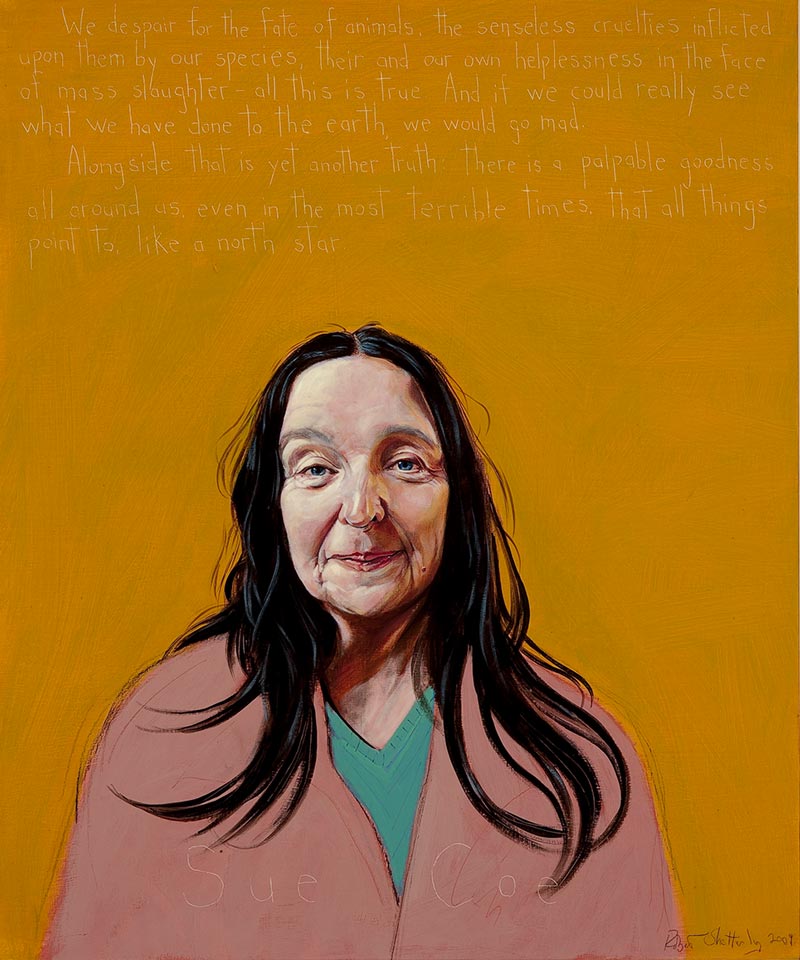
Sue Coe
Artist : b. 1951
“We despair for the fate of animals, the senseless cruelties inflicted upon them by our species, their and our own helplessness in the face of mass slaughter–all this is true. And if we could really see what we have done to the earth, we would go mad. Alongside that is yet another truth: there is a palpable goodness all around us, even in the most terrible times, that all things point to, like the north star.”
Biography
Open to any page of Sue Coe’s Dead Meat, a book of art and essays published in 1996, or Sheep of Fools, published in 2005, and you will be sickened and sobered by what you see. Many of the images Coe creates to portray the horrors of factory-farming practices are gruesome and hard to look at; at the same time they reveal her commitment to using art to expose “realities in a way that stops us dead in our tracks.”
Born in England, Sue Coe came to the United States in 1972 and began work as an illustrator for the op-ed page of The New York Times. Since then she has contributed her drawings to The Nation, Entertainment Weekly, The Progressive, The New Yorker, Rolling Stone and Artforum, among other publications, as well as authoring four books.
Coe has become known for her stark renderings of victims and their tormentors. In the mid-seventies, for example, she published many drawings illustrating violence by the Ku Klux Klan, famine in Africa, AIDS, and terrorism in Northern Ireland. Stunned by the death of Stephen Bilko, a South African anti-apartheid activist who was killed in 1977 while imprisoned by his government, Coe created a visual history of apartheid in her book How to Commit Suicide in South Africa. The book became an anti-apartheid organizing tool used in colleges to persuade investors to divest themselves of South African stock. Similarly, in her 1986 graphic book X (about the life and times of Malcolm X) Coe exposes “the hypocrisy of our economic and social institutions and debilitating legacy of American racism,” wrote a Publishers Weekly contributor. Once again, she managed to combine shocking images with objective facts, presaging renewed public interest in the African American leader.
Coe then shifted her focus to the atrocities of factory farming. Ever since awakening each morning to the screams of pigs when, as a child, she lived next to a hog farm and slaughterhouse, Coe has been a crusader against the use of animals in industry, medical research and genetic engineering. From 1986 to 1992, she visited slaughterhouses in the United States, Canada, and England, recording by camera the horrors she witnessed; when filming was not allowed, she used her sketchbook. She gained access to stockyards, a meatpacking plant, a free-range cattle ranch, dairies and egg factories.
Her extensive research resulted in a series of drawings called “Porkopolis,” her term for Cincinnati, the first centralized meat-processing center in the U.S. The result is a revealing portrait of the institutions behind the meat we eat. While her matter-of-fact, first-person account is political, and she clearly hopes it will make readers think twice about what they put into their mouths, she does not preach and is unafraid to confront her own complicity: “Every dollar I get drips with blood, too.”
Published in 1996 as Dead Meat, the series depicts practices used in the meat industry that are often well-hidden in modern society. In an interview with Elin Slavick in 2005, Coe stated: “We need to educate the public about how ‘food’ is raised. I believe in the goodness of people, and I think people are intelligent enough to make a choice. Open the doors to the slaughterhouses and the factory farms. Let people see how sows are tethered in crates their entire lives, standing on slats or concrete, not enough room to turn around. Pigs, in a natural state, would spend 70% of their waking hours exploring their environment, making nests, rooting in the dirt and socializing.”
Through her visual art, Coe continues to raise the public’s awareness of the abuse of living things. In her graphic novel, Pit’s Letter, she exposes the brutal mistreatment of dogs and the misuse and torture of animals in experimental science labs. In a series of prints, she conveys the horrors of war, beginning with Kosovo and ending with the Middle East, leaving no atrocity unseen. Other projects include 9-11, on the collapse of the World Trade Center and her publication Bully: Master of the Global Merry-Go-Round (2004), a critique of the Bush administration.
Coe says she is able to pursue her artistic activism because she is an optimist. She believes that when wrongs are revealed to people, they will listen, contemplate the situations, and in many cases take action. Says Coe, “I couldn’t do what I am doing if I believed otherwise.”
Programs
Americans Who Tell the Truth (AWTT) offers a variety of ways to engage with its portraits and portrait subjects. Host an exhibit, use our free lesson plans and educational programs, or engage with a member of the AWTT team or portrait subjects.

Education
AWTT has educational materials and lesson plans that ask students to grapple with truth, justice, and freedom.

Exhibits & Community Engagement
AWTT encourages community engagement programs and exhibits accompanied by public events that stimulate dialogue around citizenship, education, and activism.